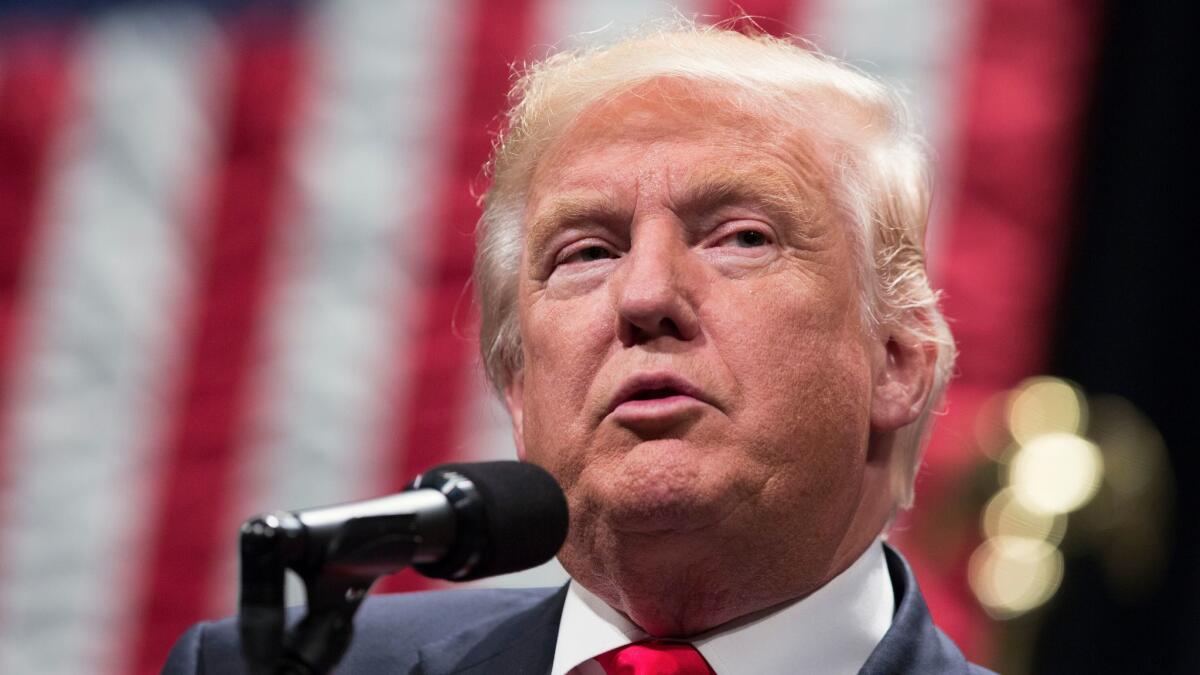Op-Ed: What is Donald Trump hiding in his tax returns? And will they ever see the light of day?

- Share via
During and after his campaign, President Trump pledged to release his tax returns as soon as the Internal Revenue Service was done auditing him. Then he recanted, claiming that Americans don’t care about the issue.
In fact, Americans do care. A poll conducted by ABC News/Washington Post in January found that 74% of people surveyed and 49% of those who voted for Trump said the president should release his returns.
Every major party nominee since Richard Nixon has done so except Gerald Ford, who released a summary. What is Trump hiding? And how might his tax returns see the light of day?
* Trump’s tax returns could expose the extent of his global business entanglements, including potential conflicts of interest that violate the Constitution’s emoluments clause. In particular, Trump’s returns could tell us quite a bit about his ties to Russian entities and banks. Although Trump has claimed he has no business or loans in Russia, his son said in 2008 that “we see a lot money pouring in from Russia.”
* Trump’s returns could reveal that he isn’t as wealthy or successful as he has claimed. As a candidate, Trump made much of his business acumen and claimed to be worth $10 billion. But Forbes put the figure at $4.1 billion, and Trump’s returns might show that even this number is a wild exaggeration.
During a presidential debate last fall, Trump bragged that not paying federal income taxes ‘makes me smart.’
* The returns could show that Trump has paid little or no federal income taxes. His 1995 tax records, made public by the New York Times in October, revealed that he claimed a $916-million loss that could have allowed him to avoid paying income taxes for up to 18 years. During a presidential debate last fall, Trump bragged that not paying federal income taxes “makes me smart.”
* Finally, the returns might reveal that Trump, who has long claimed to be a generous philanthropist, gives little or no money to charity. After Trump released a 93-page list of alleged charitable donations totaling $102 million, a Washington Post investigation could confirm only one of those donations — a gift of under $10,000. The paper has also established that Trump used his foundation for business purposes and to settle legal disputes involving his for-profit companies, both violations of federal tax laws.
There are a number of ways Trump’s tax records could be made public.
* Congress has the authority to obtain them under a complex statute in the Internal Revenue Code, Section 6103, which allows three congressional committees to obtain private tax information from the IRS in order to investigate presidential conflicts of interest. The committee can then vote on whether to disclose the information to the public.
Of course, it is unlikely that the Republican-led Congress will use its power to get the returns. Democratic New Jersey Rep. Bill Pascrell sent a letter to House Ways and Means Chairman Kevin Brady (R-Texas) in February, asking the committee to obtain 10 years’ worth of Trump’s returns. Brady refused.
If the Democrats win a majority in either the House or Senate next year, they could vote to obtain Trump’s returns. They could also pass a law requiring that all presidents release their tax records, though it is unlikely Trump would sign it.
* Trump’s tax records could be made public as a result of a lawsuit filed in New York by a team of constitutional scholars alleging that Trump is in violation of the emoluments clause. The legal team intends to ask for Trump’s returns in order to ascertain what income, loans or other payments he has received from foreign governments. The courts must first rule on whether the group has standing to file the suit.
* The records could also be made public if attorneys general in states where Trump has business dealings were to sue him for violating the emoluments clause, as Fordham University Law School professor Jed Schugerman recently argued. Such suits could give a state attorney general access to the returns, which could then be provided to a congressional committee under 6103.
* Finally, there is the possibility that a member of the IRS staff or someone within Trump’s own operation would leak his tax returns, either to the media or to Congress.
An IRS leaker would have to be willing to risk ending his or her career with the federal government, paying a fine and even spending time in prison. However, Georgetown University law professor Gregory Klass recently pointed out that the 6103 law grants whistle-blower protections to federal employees who leak tax returns to Congress — “if such person believes such return or return information may relate to possible misconduct, maladministration, or taxpayer abuse.”
Any leaker would need to believe that Trump’s tax returns are so damaging that bringing him down would serve a higher purpose — would, say, protect our democracy from a president with little respect for the Constitution, the separation of powers and the rule of law. The number of people who share this belief grows every day.
Peter Dreier is professor of politics at Occidental College.
Follow the Opinion section on Twitter @latimesopinion or Facebook
MORE FROM OPINION
‘A Day Without a Woman’ is a strike for privileged protesters
Republicans: Don’t enable Trump’s absurd Obama wiretapping accusation
All Trump has to do is sound presidential to get everything he wants. Instead, he logs on to Twitter
More to Read
A cure for the common opinion
Get thought-provoking perspectives with our weekly newsletter.
You may occasionally receive promotional content from the Los Angeles Times.









